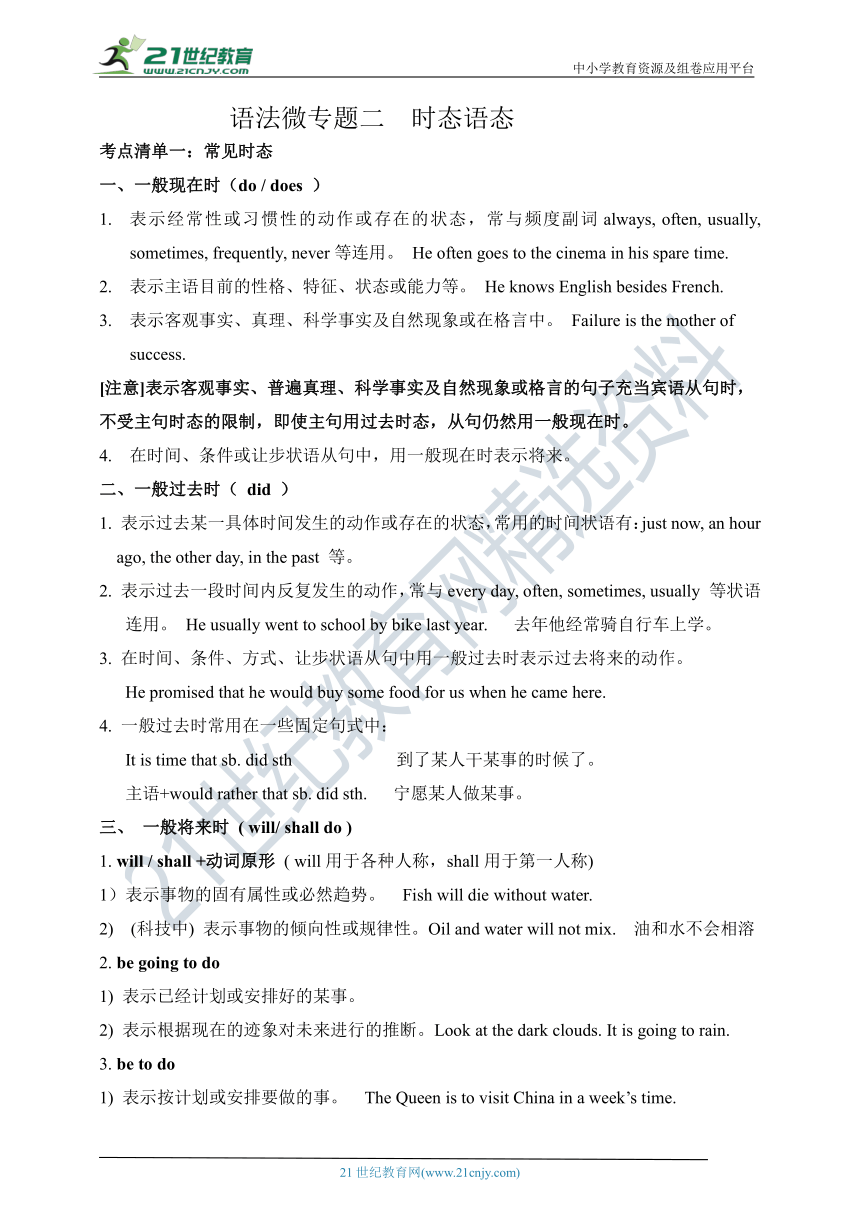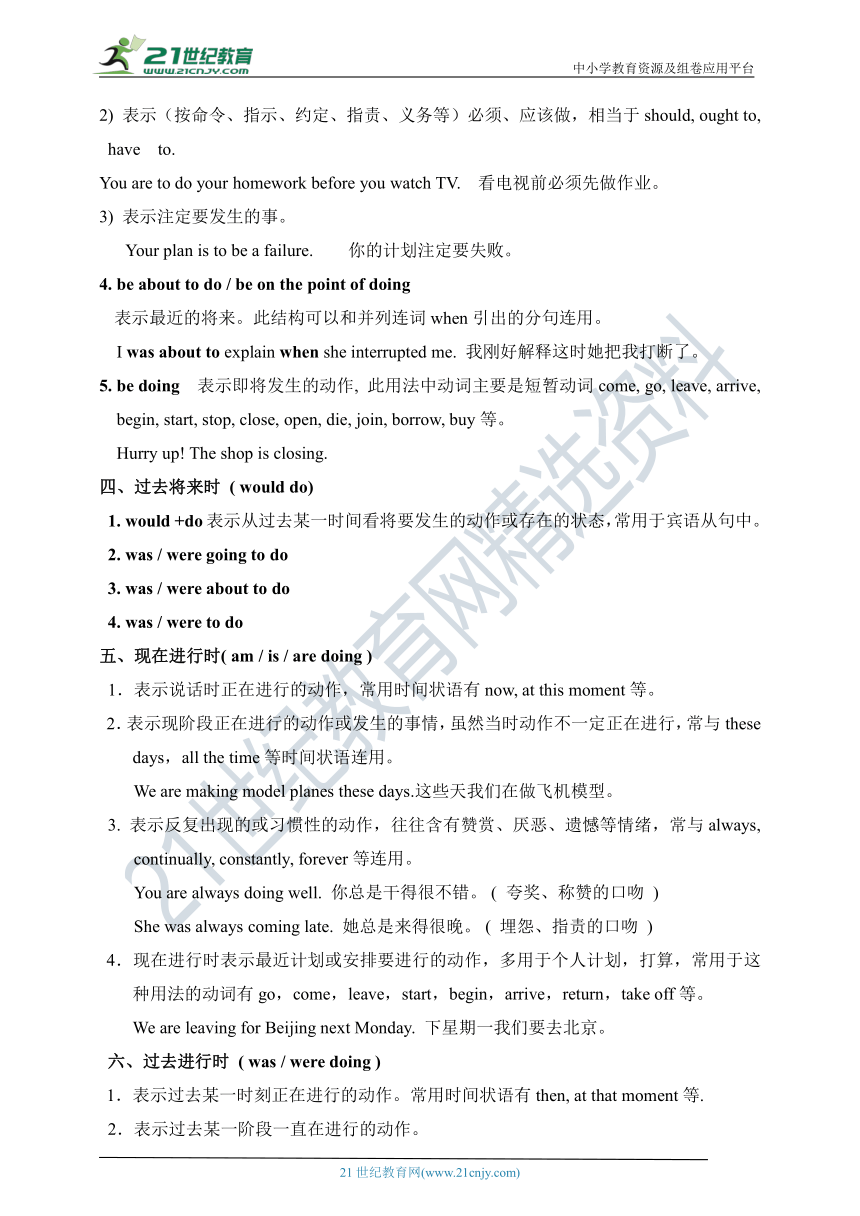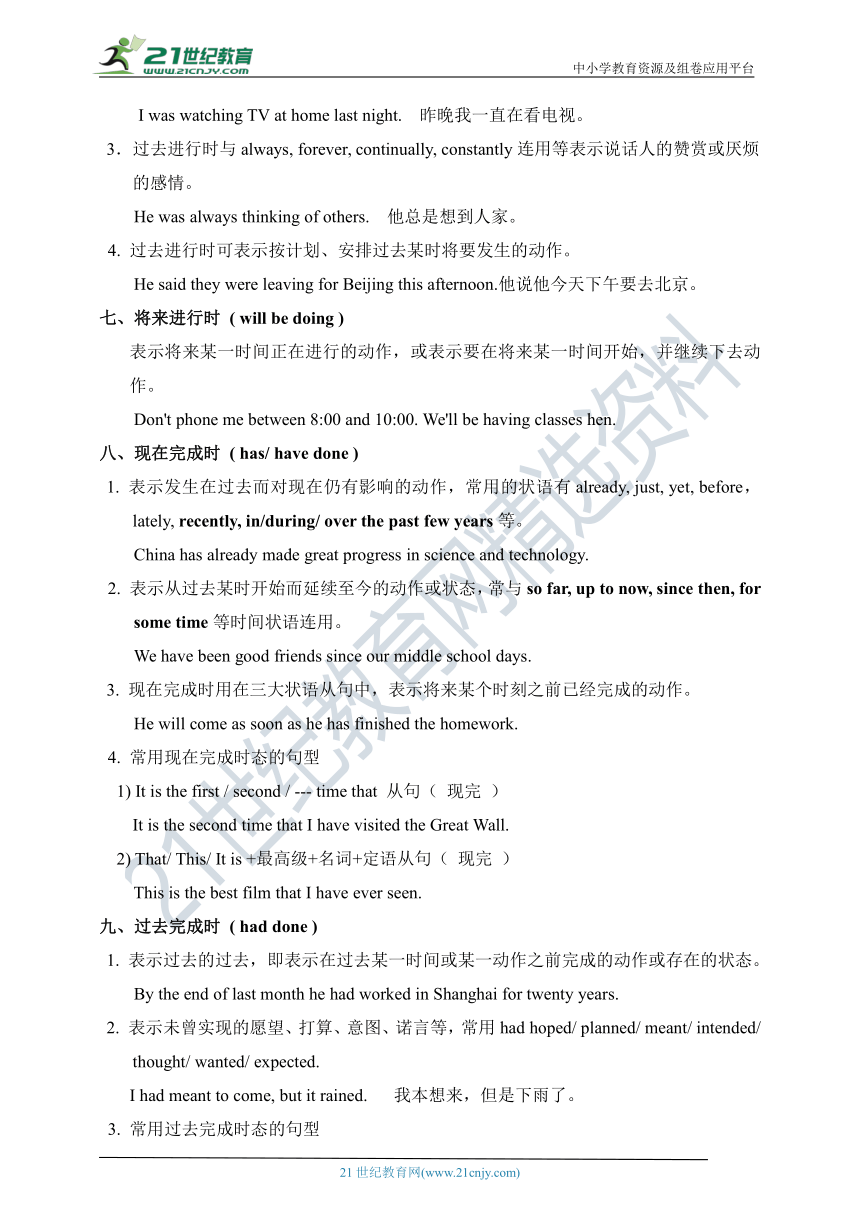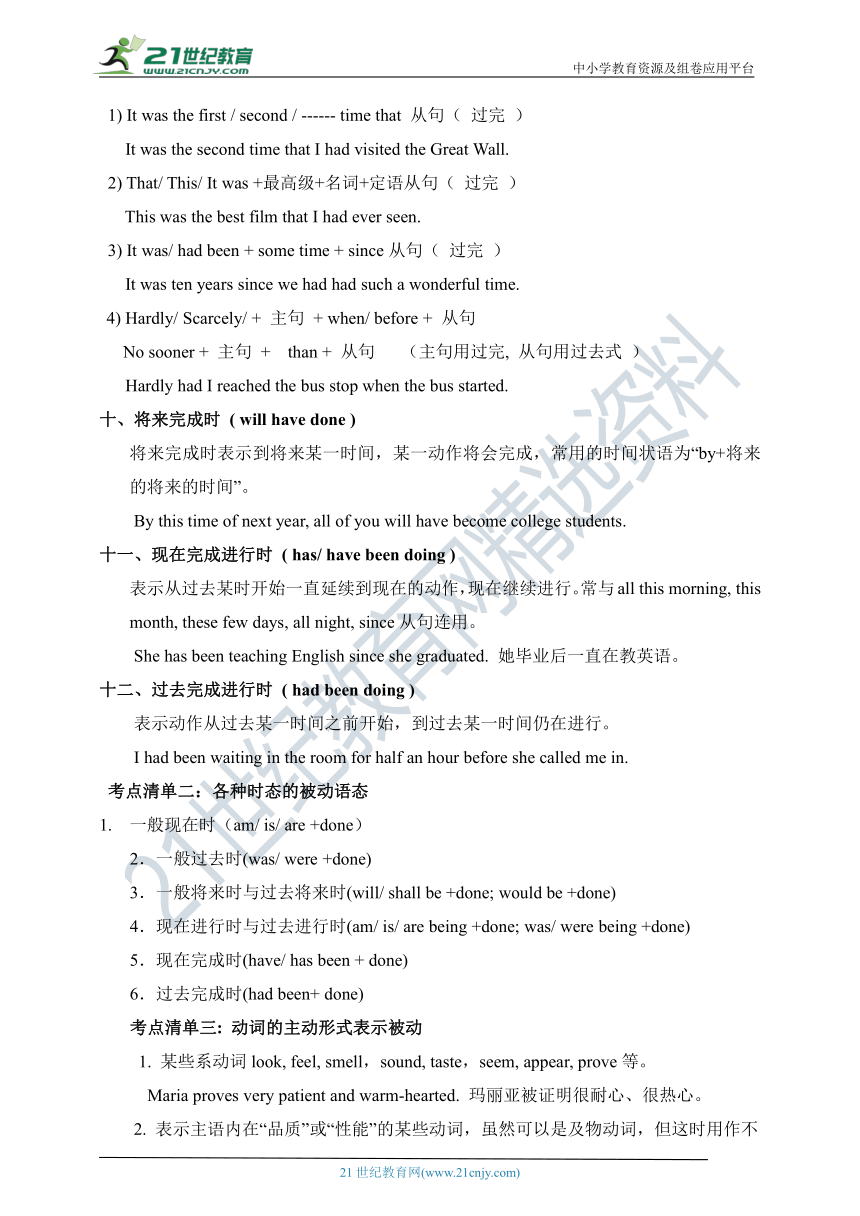【高考英语宝典】考前语法微专题二 时态语态(含答案)
文档属性
| 名称 | 【高考英语宝典】考前语法微专题二 时态语态(含答案) |  | |
| 格式 | doc | ||
| 文件大小 | 1.3MB | ||
| 资源类型 | 试卷 | ||
| 版本资源 | 通用版 | ||
| 科目 | 英语 | ||
| 更新时间 | 2022-05-05 19:24:26 | ||
图片预览




文档简介
中小学教育资源及组卷应用平台
语法微专题二 时态语态
考点清单一:常见时态
一、一般现在时(do / does )
表示经常性或习惯性的动作或存在的状态,常与频度副词always, often, usually, sometimes, frequently, never等连用。 He often goes to the cinema in his spare time.
表示主语目前的性格、特征、状态或能力等。 He knows English besides French.
表示客观事实、真理、科学事实及自然现象或在格言中。 Failure is the mother of success.
[注意]表示客观事实、普遍真理、科学事实及自然现象或格言的句子充当宾语从句时,不受主句时态的限制,即使主句用过去时态,从句仍然用一般现在时。
在时间、条件或让步状语从句中,用一般现在时表示将来。
二、一般过去时( did )
1. 表示过去某一具体时间发生的动作或存在的状态,常用的时间状语有:just now, an hour ago, the other day, in the past 等。
2. 表示过去一段时间内反复发生的动作,常与every day, often, sometimes, usually 等状语连用。 He usually went to school by bike last year. 去年他经常骑自行车上学。
3. 在时间、条件、方式、让步状语从句中用一般过去时表示过去将来的动作。
He promised that he would buy some food for us when he came here.
4. 一般过去时常用在一些固定句式中:
It is time that sb. did sth 到了某人干某事的时候了。
主语+would rather that sb. did sth. 宁愿某人做某事。
三、 一般将来时 ( will/ shall do )
1. will / shall +动词原形 ( will用于各种人称,shall用于第一人称)
1)表示事物的固有属性或必然趋势。 Fish will die without water.
2) (科技中) 表示事物的倾向性或规律性。Oil and water will not mix. 油和水不会相溶
2. be going to do
1) 表示已经计划或安排好的某事。
2) 表示根据现在的迹象对未来进行的推断。Look at the dark clouds. It is going to rain.
3. be to do
1) 表示按计划或安排要做的事。 The Queen is to visit China in a week’s time.
2) 表示(按命令、指示、约定、指责、义务等)必须、应该做,相当于should, ought to, have to.
You are to do your homework before you watch TV. 看电视前必须先做作业。
3) 表示注定要发生的事。
Your plan is to be a failure. 你的计划注定要失败。
4. be about to do / be on the point of doing
表示最近的将来。此结构可以和并列连词when引出的分句连用。
I was about to explain when she interrupted me. 我刚好解释这时她把我打断了。
5. be doing 表示即将发生的动作, 此用法中动词主要是短暂动词come, go, leave, arrive, begin, start, stop, close, open, die, join, borrow, buy等。
Hurry up! The shop is closing.
四、过去将来时 ( would do)
1. would +do表示从过去某一时间看将要发生的动作或存在的状态,常用于宾语从句中。
2. was / were going to do
3. was / were about to do
4. was / were to do
五、现在进行时( am / is / are doing )
1.表示说话时正在进行的动作,常用时间状语有now, at this moment等。
2.表示现阶段正在进行的动作或发生的事情,虽然当时动作不一定正在进行,常与these days,all the time等时间状语连用。
We are making model planes these days.这些天我们在做飞机模型。
3. 表示反复出现的或习惯性的动作,往往含有赞赏、厌恶、遗憾等情绪,常与always, continually, constantly, forever等连用。
You are always doing well. 你总是干得很不错。 ( 夸奖、称赞的口吻 )
She was always coming late. 她总是来得很晚。 ( 埋怨、指责的口吻 )
4.现在进行时表示最近计划或安排要进行的动作,多用于个人计划,打算,常用于这种用法的动词有go,come,leave,start,begin,arrive,return,take off等。
We are leaving for Beijing next Monday. 下星期一我们要去北京。
六、过去进行时 ( was / were doing )
1.表示过去某一时刻正在进行的动作。常用时间状语有then, at that moment等.
2.表示过去某一阶段一直在进行的动作。
I was watching TV at home last night. 昨晚我一直在看电视。
3.过去进行时与always, forever, continually, constantly连用等表示说话人的赞赏或厌烦的感情。
He was always thinking of others. 他总是想到人家。
4. 过去进行时可表示按计划、安排过去某时将要发生的动作。
He said they were leaving for Beijing this afternoon.他说他今天下午要去北京。
七、将来进行时 ( will be doing )
表示将来某一时间正在进行的动作,或表示要在将来某一时间开始,并继续下去动作。
Don't phone me between 8:00 and 10:00. We'll be having classes hen.
八、现在完成时 ( has/ have done )
1. 表示发生在过去而对现在仍有影响的动作,常用的状语有already, just, yet, before,lately, recently, in/during/ over the past few years等。
China has already made great progress in science and technology.
2. 表示从过去某时开始而延续至今的动作或状态,常与so far, up to now, since then, for some time等时间状语连用。
We have been good friends since our middle school days.
3. 现在完成时用在三大状语从句中,表示将来某个时刻之前已经完成的动作。
He will come as soon as he has finished the homework.
4. 常用现在完成时态的句型
1) It is the first / second / --- time that 从句( 现完 )
It is the second time that I have visited the Great Wall.
2) That/ This/ It is +最高级+名词+定语从句( 现完 )
This is the best film that I have ever seen.
九、过去完成时 ( had done )
1. 表示过去的过去,即表示在过去某一时间或某一动作之前完成的动作或存在的状态。
By the end of last month he had worked in Shanghai for twenty years.
2. 表示未曾实现的愿望、打算、意图、诺言等,常用had hoped/ planned/ meant/ intended/ thought/ wanted/ expected.
I had meant to come, but it rained. 我本想来,但是下雨了。
3. 常用过去完成时态的句型
1) It was the first / second / ------ time that 从句( 过完 )
It was the second time that I had visited the Great Wall.
2) That/ This/ It was +最高级+名词+定语从句( 过完 )
This was the best film that I had ever seen.
3) It was/ had been + some time + since从句( 过完 )
It was ten years since we had had such a wonderful time.
4) Hardly/ Scarcely/ + 主句 + when/ before + 从句
No sooner + 主句 + than + 从句 (主句用过完, 从句用过去式 )
Hardly had I reached the bus stop when the bus started.
十、将来完成时 ( will have done )
将来完成时表示到将来某一时间,某一动作将会完成,常用的时间状语为“by+将来的将来的时间”。
By this time of next year, all of you will have become college students.
十一、现在完成进行时 ( has/ have been doing )
表示从过去某时开始一直延续到现在的动作,现在继续进行。常与all this morning, this month, these few days, all night, since从句连用。
She has been teaching English since she graduated. 她毕业后一直在教英语。
十二、过去完成进行时 ( had been doing )
表示动作从过去某一时间之前开始,到过去某一时间仍在进行。
I had been waiting in the room for half an hour before she called me in.
考点清单二:各种时态的被动语态
一般现在时(am/ is/ are +done)
2.一般过去时(was/ were +done)
3.一般将来时与过去将来时(will/ shall be +done; would be +done)
4.现在进行时与过去进行时(am/ is/ are being +done; was/ were being +done)
5.现在完成时(have/ has been + done)
6.过去完成时(had been+ done)
考点清单三: 动词的主动形式表示被动
1. 某些系动词look, feel, smell,sound, taste,seem, appear, prove等。
Maria proves very patient and warm-hearted. 玛丽亚被证明很耐心、很热心。
2. 表示主语内在“品质”或“性能”的某些动词,虽然可以是及物动词,但这时用作不及物动词,如:lock, shut, close, open, move, read, write, sell, wash, clean, burn, run, operate等,常与well, easily, badly, smoothly等副词连用。
The shirt doesn’t wash well. 这件衬衫不好洗。
3.open, close, lock, move, begin, start, finish, end等与won’t, can’t, wouldn’t等词连用时。
The door won’t shut. 这个门关不上。
典型题目
1.What comes next is the endless series of steps. You can't help wondering how hard it _______________ ( be ) for the people then to put all those rocks into place.
2.The Xi’an City Wall ______________ ( build ) originally to protect the city in the Tang dynasty and has now been completely restored.
3.The unmanned Chang’e-4 probe (探测器) -- the name was inspired by an ancient Chinese moon goddess ( touch ) down last week in the South Pole-Aitken basin.
4.The artist was sure he would _____________( choose ), but when he presented his masterpiece to the emperor's chief minister, the old man laughed.
5.In recent years some Inuit people in Nunavut _____________( report ) increases in bear sightings around human settlements, leading to a belief that populations are increasing.
6.I love coming here and seeing my family and all the friends I ___ ( make ) over the years.
7.Our hosts shared many of their experiences and______________( recommend ) wonderful places to eat, shop, and visit.
8.On the last day of our week-long stay, we ( invite ) to attend a private concert on a beautiful farm.
9. I jumped with joy the moment I _______________ ( receive ) my driver’s license in the mail.
10. Charlie’s wheelchair _________________ ( run ) out of power. He drove it into my office and looked for a place to charge it.
11. When Stanley finally made it to the lecture hall, the professor ________________ ( deliver ) his speech for half an hour.
12. I __________________ ( intend ) to give you just a surprise quiz but on second thought I chose to let you reflect on your exercises.
13. One of the miners __________________ ( trap ) underground for a long time last week.
14. So far, the government _________________ ( offer ) tax reduction for bookstores to encourage the development of physical bookstores.
15. The traditional Chinese marriage usually _______________ ( involve ) some necessary procedures, such as matching making, engagements, meeting the bride, and three bows.
16. Chinese has an extremely rich vocabulary since it ________________ ( borrow ) many words from other languages.
17. By this time next summer, you _________________ ( find ) a well-paid job
18. Over the past 40 years, China ________________ ( witness ) significant change in comprehensive national strength thanks to the reform and opening-up policy.
19. The musician along with his band member ________________ ( give ) ten performances in the last three months.
20. I ___________________ ( hope ) to send Peter a gift to congratulate him on his marriage, but I couldn’t manage it.
21. Amy, as well as her brothers, _________________ ( give ) a warm welcome when returning to the village last week.
22. When every pupil in the school wears the uniform, nobody____ ( have ) to worry about fashion.
23. By about 6000 BC, people __________ ( discover ) the best crops to grow and animals to raise.
答案:
was
was built
touched
be chosen
have reported
have made
recommended
were invited
received
was running
had delivered
had intended
was trapped
has offered
involves
has borrowed
will have found
has witnessed
has given
had hoped
was given
has
had discovered
21世纪教育网 www.21cnjy.com 精品试卷·第 2 页 (共 2 页)
HYPERLINK "http://21世纪教育网(www.21cnjy.com)
" 21世纪教育网(www.21cnjy.com)
语法微专题二 时态语态
考点清单一:常见时态
一、一般现在时(do / does )
表示经常性或习惯性的动作或存在的状态,常与频度副词always, often, usually, sometimes, frequently, never等连用。 He often goes to the cinema in his spare time.
表示主语目前的性格、特征、状态或能力等。 He knows English besides French.
表示客观事实、真理、科学事实及自然现象或在格言中。 Failure is the mother of success.
[注意]表示客观事实、普遍真理、科学事实及自然现象或格言的句子充当宾语从句时,不受主句时态的限制,即使主句用过去时态,从句仍然用一般现在时。
在时间、条件或让步状语从句中,用一般现在时表示将来。
二、一般过去时( did )
1. 表示过去某一具体时间发生的动作或存在的状态,常用的时间状语有:just now, an hour ago, the other day, in the past 等。
2. 表示过去一段时间内反复发生的动作,常与every day, often, sometimes, usually 等状语连用。 He usually went to school by bike last year. 去年他经常骑自行车上学。
3. 在时间、条件、方式、让步状语从句中用一般过去时表示过去将来的动作。
He promised that he would buy some food for us when he came here.
4. 一般过去时常用在一些固定句式中:
It is time that sb. did sth 到了某人干某事的时候了。
主语+would rather that sb. did sth. 宁愿某人做某事。
三、 一般将来时 ( will/ shall do )
1. will / shall +动词原形 ( will用于各种人称,shall用于第一人称)
1)表示事物的固有属性或必然趋势。 Fish will die without water.
2) (科技中) 表示事物的倾向性或规律性。Oil and water will not mix. 油和水不会相溶
2. be going to do
1) 表示已经计划或安排好的某事。
2) 表示根据现在的迹象对未来进行的推断。Look at the dark clouds. It is going to rain.
3. be to do
1) 表示按计划或安排要做的事。 The Queen is to visit China in a week’s time.
2) 表示(按命令、指示、约定、指责、义务等)必须、应该做,相当于should, ought to, have to.
You are to do your homework before you watch TV. 看电视前必须先做作业。
3) 表示注定要发生的事。
Your plan is to be a failure. 你的计划注定要失败。
4. be about to do / be on the point of doing
表示最近的将来。此结构可以和并列连词when引出的分句连用。
I was about to explain when she interrupted me. 我刚好解释这时她把我打断了。
5. be doing 表示即将发生的动作, 此用法中动词主要是短暂动词come, go, leave, arrive, begin, start, stop, close, open, die, join, borrow, buy等。
Hurry up! The shop is closing.
四、过去将来时 ( would do)
1. would +do表示从过去某一时间看将要发生的动作或存在的状态,常用于宾语从句中。
2. was / were going to do
3. was / were about to do
4. was / were to do
五、现在进行时( am / is / are doing )
1.表示说话时正在进行的动作,常用时间状语有now, at this moment等。
2.表示现阶段正在进行的动作或发生的事情,虽然当时动作不一定正在进行,常与these days,all the time等时间状语连用。
We are making model planes these days.这些天我们在做飞机模型。
3. 表示反复出现的或习惯性的动作,往往含有赞赏、厌恶、遗憾等情绪,常与always, continually, constantly, forever等连用。
You are always doing well. 你总是干得很不错。 ( 夸奖、称赞的口吻 )
She was always coming late. 她总是来得很晚。 ( 埋怨、指责的口吻 )
4.现在进行时表示最近计划或安排要进行的动作,多用于个人计划,打算,常用于这种用法的动词有go,come,leave,start,begin,arrive,return,take off等。
We are leaving for Beijing next Monday. 下星期一我们要去北京。
六、过去进行时 ( was / were doing )
1.表示过去某一时刻正在进行的动作。常用时间状语有then, at that moment等.
2.表示过去某一阶段一直在进行的动作。
I was watching TV at home last night. 昨晚我一直在看电视。
3.过去进行时与always, forever, continually, constantly连用等表示说话人的赞赏或厌烦的感情。
He was always thinking of others. 他总是想到人家。
4. 过去进行时可表示按计划、安排过去某时将要发生的动作。
He said they were leaving for Beijing this afternoon.他说他今天下午要去北京。
七、将来进行时 ( will be doing )
表示将来某一时间正在进行的动作,或表示要在将来某一时间开始,并继续下去动作。
Don't phone me between 8:00 and 10:00. We'll be having classes hen.
八、现在完成时 ( has/ have done )
1. 表示发生在过去而对现在仍有影响的动作,常用的状语有already, just, yet, before,lately, recently, in/during/ over the past few years等。
China has already made great progress in science and technology.
2. 表示从过去某时开始而延续至今的动作或状态,常与so far, up to now, since then, for some time等时间状语连用。
We have been good friends since our middle school days.
3. 现在完成时用在三大状语从句中,表示将来某个时刻之前已经完成的动作。
He will come as soon as he has finished the homework.
4. 常用现在完成时态的句型
1) It is the first / second / --- time that 从句( 现完 )
It is the second time that I have visited the Great Wall.
2) That/ This/ It is +最高级+名词+定语从句( 现完 )
This is the best film that I have ever seen.
九、过去完成时 ( had done )
1. 表示过去的过去,即表示在过去某一时间或某一动作之前完成的动作或存在的状态。
By the end of last month he had worked in Shanghai for twenty years.
2. 表示未曾实现的愿望、打算、意图、诺言等,常用had hoped/ planned/ meant/ intended/ thought/ wanted/ expected.
I had meant to come, but it rained. 我本想来,但是下雨了。
3. 常用过去完成时态的句型
1) It was the first / second / ------ time that 从句( 过完 )
It was the second time that I had visited the Great Wall.
2) That/ This/ It was +最高级+名词+定语从句( 过完 )
This was the best film that I had ever seen.
3) It was/ had been + some time + since从句( 过完 )
It was ten years since we had had such a wonderful time.
4) Hardly/ Scarcely/ + 主句 + when/ before + 从句
No sooner + 主句 + than + 从句 (主句用过完, 从句用过去式 )
Hardly had I reached the bus stop when the bus started.
十、将来完成时 ( will have done )
将来完成时表示到将来某一时间,某一动作将会完成,常用的时间状语为“by+将来的将来的时间”。
By this time of next year, all of you will have become college students.
十一、现在完成进行时 ( has/ have been doing )
表示从过去某时开始一直延续到现在的动作,现在继续进行。常与all this morning, this month, these few days, all night, since从句连用。
She has been teaching English since she graduated. 她毕业后一直在教英语。
十二、过去完成进行时 ( had been doing )
表示动作从过去某一时间之前开始,到过去某一时间仍在进行。
I had been waiting in the room for half an hour before she called me in.
考点清单二:各种时态的被动语态
一般现在时(am/ is/ are +done)
2.一般过去时(was/ were +done)
3.一般将来时与过去将来时(will/ shall be +done; would be +done)
4.现在进行时与过去进行时(am/ is/ are being +done; was/ were being +done)
5.现在完成时(have/ has been + done)
6.过去完成时(had been+ done)
考点清单三: 动词的主动形式表示被动
1. 某些系动词look, feel, smell,sound, taste,seem, appear, prove等。
Maria proves very patient and warm-hearted. 玛丽亚被证明很耐心、很热心。
2. 表示主语内在“品质”或“性能”的某些动词,虽然可以是及物动词,但这时用作不及物动词,如:lock, shut, close, open, move, read, write, sell, wash, clean, burn, run, operate等,常与well, easily, badly, smoothly等副词连用。
The shirt doesn’t wash well. 这件衬衫不好洗。
3.open, close, lock, move, begin, start, finish, end等与won’t, can’t, wouldn’t等词连用时。
The door won’t shut. 这个门关不上。
典型题目
1.What comes next is the endless series of steps. You can't help wondering how hard it _______________ ( be ) for the people then to put all those rocks into place.
2.The Xi’an City Wall ______________ ( build ) originally to protect the city in the Tang dynasty and has now been completely restored.
3.The unmanned Chang’e-4 probe (探测器) -- the name was inspired by an ancient Chinese moon goddess ( touch ) down last week in the South Pole-Aitken basin.
4.The artist was sure he would _____________( choose ), but when he presented his masterpiece to the emperor's chief minister, the old man laughed.
5.In recent years some Inuit people in Nunavut _____________( report ) increases in bear sightings around human settlements, leading to a belief that populations are increasing.
6.I love coming here and seeing my family and all the friends I ___ ( make ) over the years.
7.Our hosts shared many of their experiences and______________( recommend ) wonderful places to eat, shop, and visit.
8.On the last day of our week-long stay, we ( invite ) to attend a private concert on a beautiful farm.
9. I jumped with joy the moment I _______________ ( receive ) my driver’s license in the mail.
10. Charlie’s wheelchair _________________ ( run ) out of power. He drove it into my office and looked for a place to charge it.
11. When Stanley finally made it to the lecture hall, the professor ________________ ( deliver ) his speech for half an hour.
12. I __________________ ( intend ) to give you just a surprise quiz but on second thought I chose to let you reflect on your exercises.
13. One of the miners __________________ ( trap ) underground for a long time last week.
14. So far, the government _________________ ( offer ) tax reduction for bookstores to encourage the development of physical bookstores.
15. The traditional Chinese marriage usually _______________ ( involve ) some necessary procedures, such as matching making, engagements, meeting the bride, and three bows.
16. Chinese has an extremely rich vocabulary since it ________________ ( borrow ) many words from other languages.
17. By this time next summer, you _________________ ( find ) a well-paid job
18. Over the past 40 years, China ________________ ( witness ) significant change in comprehensive national strength thanks to the reform and opening-up policy.
19. The musician along with his band member ________________ ( give ) ten performances in the last three months.
20. I ___________________ ( hope ) to send Peter a gift to congratulate him on his marriage, but I couldn’t manage it.
21. Amy, as well as her brothers, _________________ ( give ) a warm welcome when returning to the village last week.
22. When every pupil in the school wears the uniform, nobody____ ( have ) to worry about fashion.
23. By about 6000 BC, people __________ ( discover ) the best crops to grow and animals to raise.
答案:
was
was built
touched
be chosen
have reported
have made
recommended
were invited
received
was running
had delivered
had intended
was trapped
has offered
involves
has borrowed
will have found
has witnessed
has given
had hoped
was given
has
had discovered
21世纪教育网 www.21cnjy.com 精品试卷·第 2 页 (共 2 页)
HYPERLINK "http://21世纪教育网(www.21cnjy.com)
" 21世纪教育网(www.21cnjy.com)
同课章节目录
